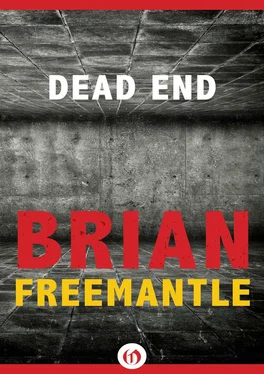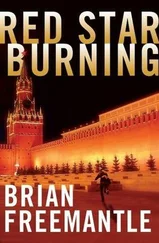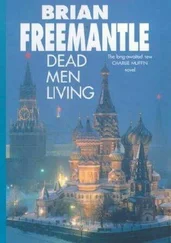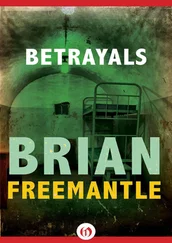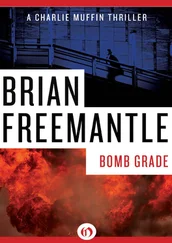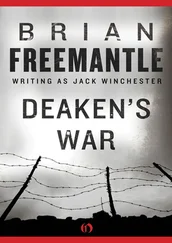Brian Freemantle - Dead End
Здесь есть возможность читать онлайн «Brian Freemantle - Dead End» весь текст электронной книги совершенно бесплатно (целиком полную версию без сокращений). В некоторых случаях можно слушать аудио, скачать через торрент в формате fb2 и присутствует краткое содержание. Жанр: Триллер, на английском языке. Описание произведения, (предисловие) а так же отзывы посетителей доступны на портале библиотеки ЛибКат.
- Название:Dead End
- Автор:
- Жанр:
- Год:неизвестен
- ISBN:нет данных
- Рейтинг книги:3 / 5. Голосов: 1
-
Избранное:Добавить в избранное
- Отзывы:
-
Ваша оценка:
- 60
- 1
- 2
- 3
- 4
- 5
Dead End: краткое содержание, описание и аннотация
Предлагаем к чтению аннотацию, описание, краткое содержание или предисловие (зависит от того, что написал сам автор книги «Dead End»). Если вы не нашли необходимую информацию о книге — напишите в комментариях, мы постараемся отыскать её.
Dead End — читать онлайн бесплатно полную книгу (весь текст) целиком
Ниже представлен текст книги, разбитый по страницам. Система сохранения места последней прочитанной страницы, позволяет с удобством читать онлайн бесплатно книгу «Dead End», без необходимости каждый раз заново искать на чём Вы остановились. Поставьте закладку, и сможете в любой момент перейти на страницу, на которой закончили чтение.
Интервал:
Закладка:
Parnell kept to his intention to spend the early part of Saturday rereading those CVs so far submitted, and which he had taken home with him from McLean, but still arrived at the Tidal Basin before Rebecca. She wore no make-up and had followed his advice, with the bill cap, thick sweater and jeans.
‘So, we’re going on the river?’ she guessed.
‘Don’t you like the water?’
‘Let’s find out.’
There were only tourist skiffs available, thick-bodied and cumbersome compared to the racing sculls to which he was accustomed, and Rebecca hindered more than helped by trying too enthusiastically to steer, too often taking the boat across instead of into the current once they got out on to the Potomac. He went upriver, past the canoe club by the Key Bridge, disappointed that he began so quickly to feel the strain across his back and shoulders, and resolved yet again to use the sports facilities in the Dubette building. Despite his slowly recited instructions, she brought the boat about too sharply for the turn, actually shipping water. It was easier going downstream, but Parnell was still relieved to get back into the basin.
They snacked off hot dogs from a stall and at the stand-up table Rebecca announced: ‘I’m impressed.’
‘You’re supposed to be,’ said Parnell, uncomfortable now at the posturing he so easily criticized in others. Because of the sudden embarrassment, he cut short the account of coming as close as he had to representing Cambridge in the traditional annual boat race.
‘But you didn’t make it?’
‘No.’
‘Pissed off?’
‘Very.’
‘Never the loser?’
‘Never if I can help it.’
They walked without any positive direction across Constitution Gardens but decided against going to the Smithsonian. When he suggested a movie, she said: ‘Or we could food shop and I could cook dinner at your place.’
They shopped in the supermarket in the basement of the Watergate building and Parnell bought cooking wine and drinking wine from an adjoining liquor store. He’d anticipated spaghetti. Instead Rebecca cooked beef and shallots in her chosen wine, with a garlicky vegetable stew, followed by a soft goats’ cheese he’d never tasted before.
There wasn’t a lot of conversation clearing away, and afterwards they settled together on the couch, although she was distanced from him by how she curled her legs beneath her, creating a barrier between them. Their small talk became smaller and smaller. After a long pause he said: ‘You don’t want to go out to a movie?’
‘Absolutely not.’
‘Anything?’
‘Just staying here is good.’
‘I think it’s good, too.’
‘I told you I brought some clothes… things…’
‘I thought you just said…’ he began, but she stopped him.
‘I mean, I don’t have to go all the way back to Bethesda tonight.’
‘What about your Mafia connections?’
Rebecca sniggered, welcoming the lightness. ‘I was trying to impress you, like you tried earlier, breaking your back rowing up and down the river.’
‘So, we’re quits.’
‘Not quite. I told you a lie, about the bet. There never was one. I just wanted to speak to you.’
‘I’m glad.’
‘I want this to be right.’
‘So do I.’
‘So, this isn’t any big deal. Not unless it becomes one. OK?’
‘OK.’
‘You think you can manage, after all that rowing.’
‘We won’t know, until we try.’
They tried – twice – and afterwards, wetly pressed against him, Rebecca said: ‘I’m not sure I’ll be able to manage once you get in shape.’
‘I’ll be gentle.’
‘Don’t be.’
Five
The eventual establishment of Dubette’s pharmacogenomics unit took a further month and a half. The secretarial choice remained Parnell’s but, having gone through a similar process himself, he should objectively have known the choice would be decided not by him alone but by a filleting committee composed of himself, Dwight Newton, Russell Benn, Wayne Denny, company lawyer Peter Baldwin and the deputy head of the budgetary division.
Parnell’s budget was sufficient for a scientific staff of six, with a review after a year. His rejection of five candidates as underqualified was supported by the selection panel. The strongest argument against his choice of the one woman applicant came from Russell Benn, who insisted she was too inexperienced, having only graduated from medical school three years earlier. It took Parnell an hour to win a majority decision in Beverley Jackson’s favour, arguing her graduation pass was the highest of any applicant, that she’d already risen to joint deputy of the genetics research department at Johns Hopkins and published two respected scientific journal papers on the genetics links with drug research. Two of the other applicants, one from Los Angeles’ Cedars of Lebanon hospital, the other from the research department at Harvard Medical School, had also published impressively on the genome project. Ted Lapidus, a fourth applicant and the oldest candidate, with specialized experience in his native Athens before moving from Greece to the George Washington Hospital in DC, actually questioned one of Parnell’s own published opinions.
‘Which is a pretty good way of talking yourself out of a job,’ opened Newton, in the after-interview analysis.
‘I want a man with that sort of confidence,’ contradicted Parnell.
‘He probably sees himself taking over your job,’ warned Benn.
‘Then he’s going to work like hell, isn’t he?’ replied Parnell. ‘I want that, too.’
Parnell’s longest theoretical scientific discussion about applying genetics to drug development came with Deke Pulbrow, another Johns Hopkins University candidate. For almost forty-five minutes the two men conducted a debate that more than proved to Parnell’s satisfaction that Pulbrow had a much broader and deeper understanding of pharmacogenomics than had been obvious in the journal publication that Parnell had found disappointing. Not once did Newton or Benn intrude a comment or offer an opinion.
Parnell was surprised at Newton’s luncheon invitation to a log-framed inn in the North Virginia countryside, not the Dubette commissary, the day after they made their final selection.
‘I want us to get along,’ declared the research and development director, at the bar. The thin man was drinking mineral water. Parnell chose gin.
‘So do I,’ said Parnell. He was already getting a deja vu echo from this conversation – deja vu upon deja vu, in fact.
‘You really believe you can map a genetically matched responder to a genetically acceptable drug, cutting out all the rejection?’
‘Not all,’ acknowledged Parnell, realistically. ‘A lot, hopefully.’
‘How much is a lot?’
‘I can’t give an estimate, not yet.’
‘Ball-park figure?’ pressed Newton.
‘I’d be satisfied with fifty per cent.’
‘Matching fifty per cent of effective drugs to responsive patients?’ persisted Newton.
Parnell didn’t hurry his reply. Matching responsive drugs to responsive patients was the very science of pharmacogenomics. Which Newton – which none of them – should have needed explaining. So why was Newton demanding just that? ‘I don’t think I could aim higher. Who knows?’
‘So, you fit an acceptable drug to a genetically accepting patient, you knock two or three – four maybe – other drugs from a cocktail administration…’ Newton paused as if seeking an example. ‘AIDS or hepatitis, for instance?’
When the waiter came with the menu, Parnell ordered another gin and tonic and chose scrod. Newton took the same, impatient with the interruption.
‘AIDS or hepatitis,’ prompted the research director, when the waiter left.
Читать дальшеИнтервал:
Закладка:
Похожие книги на «Dead End»
Представляем Вашему вниманию похожие книги на «Dead End» списком для выбора. Мы отобрали схожую по названию и смыслу литературу в надежде предоставить читателям больше вариантов отыскать новые, интересные, ещё непрочитанные произведения.
Обсуждение, отзывы о книге «Dead End» и просто собственные мнения читателей. Оставьте ваши комментарии, напишите, что Вы думаете о произведении, его смысле или главных героях. Укажите что конкретно понравилось, а что нет, и почему Вы так считаете.
